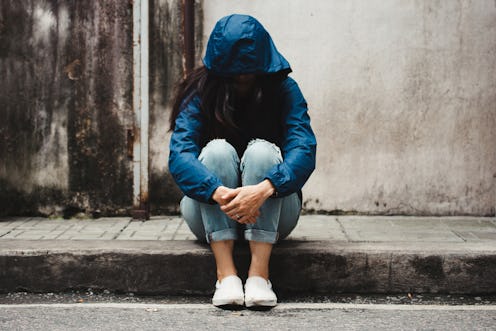Life

Humans are social animals, and without social interaction, we start to experience negative side effects. Loneliness can be stressful and harmful to your health; research has shown that feeling lonely can have long-term effects on your brain, immune system, and other aspects of your health? But sometimes, loneliness is inevitable; if you've just moved to a new place, for example, or started a new job, it may take a bit to return to your previous level of socialization. So how can you cope with loneliness, no matter its origin? Science has devoted a lot of energy to finding good coping strategies for loneliness, and they aren't all based on "going out and finding somebody to talk to."
A study in 1998 published six coping techniques for loneliness that have shaped the field ever since: "reflection and acceptance, self-development and understanding, social support network, distancing and denial, religion and faith, and increased activity." Some of these techniques are more useful than others — joining a religious group if you're not spiritual is likely not going to make you feel less isolated, for instance — and everybody has their own adaptations and personal needs. However, experts recommend these strategies if you need to feel more socially connected right now.
1
Be Realistic
Loneliness isn't an objective sensation. It's highly personal, and experts point out that it can be based on your ideas about socializing. “Loneliness is a mismatch between your ideal and what you actually have,” psychologist Dr. Louise Hawkley told Everyday Health. This idea — that loneliness is "subjective," as Hawkley puts it — can help you rearrange your conception of your situation. Maybe you'd like to have a huge network of close buddies to go out with, and know nobody at all in your new place; the gap between the reality and the fantasy will be jarring. Managing your expectations based on reality can take the sting out of loneliness.
2
Volunteer
Various studies have found that volunteering in communal places can reduce measures of loneliness — and not just because it's a means of meeting and connecting with others. One study in 2018 found that, for older adults in particular, joining community choirs was a very good way to diminish loneliness. "There's a high percentage who experience loneliness and social isolation, and depression also is relatively high," explained lead author Julene Johnson in a press release. Turning up once a week to holler out tunes was good for social connection, said the study's results, and another 2018 study found that volunteering two hours a week can reduce loneliness if you've been recently bereaved. Do something for your community, and you might find it feels good.
3
Meditate
A 2012 study looked at the practice of mindfulness-based meditation in older adults who were experiencing loneliness, and found that it seemed to help. The technique, the scientists explained, "may be a novel treatment approach for reducing loneliness and related pro-inflammatory gene expression in older adults." People in the study did eight-week groups on mindfulness with other adults, so it wasn't just about learning to meditate on their own; it was about coming together with others to feel more in tune with their mental health.
4
Seek Out Animals And Their People
The healing powers of animals are pretty well-known, but studies have also found that they can impact our sense of loneliness; one study in 2012 demonstrated that college students, who may often feel isolated and lonely in a drastically different social environment, showed lower symptoms of loneliness after time with therapy animals in group therapy sessions. "The interaction with the dog was identified as the most impactful aspect of the intervention," the study noted. Walk a dog to a dog park and introduce yourself to other owners, or volunteer (win-win!) at your local shelter.
5
Treat Yourself
Sometimes there's nobody around, and you don't know what to do with yourself. Science says it can be helpful to treat yourself, in moderation, to help cope. A study of consumer behavior and loneliness in 2017 found that "traveling and dining-out can provide significant ‘therapeutic benefits’ by repairing feelings of loneliness." These practices aren't always the most feasible — it costs money, of course, to treat yourself, though it doesn't always have to — but it does have potential for you to reframe (and deepen) your relationship with yourself.
6
Re-Focus
A study of loneliness-busting techniques in 2017 noted that there's one option that's based around "reducing the importance of the discrepancy." If there's a massive gap between your expectations of social time and your reality, this technique doesn't make those feelings go away. Instead, it says, "their importance is reduced and attention is moved away from the problem." In practice, the study notes, this means "accepting that the problem cannot be solved or changed at the moment" and instead attempting to enjoy alone time. You might not have tons of close friends, but you do have me-time to do as you like right now, which is a merit to be enjoyed.
Loneliness is incredibly frustrating while you're dealing with these feelings, but these techniques, among others, can help. Professional assistance in the form of a therapist or group therapy can also be meaningful ways to understand how you relate to loneliness, and help unlearn those feelings. You've got this.
This article was originally published on